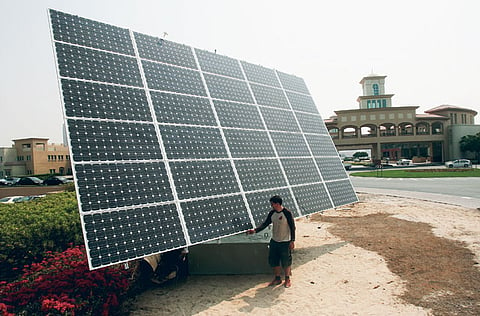Sun can shine away energy blues
Runner-up of Zayed Award says solar power will become important part of global energy mix

Dubai: As runner-up for the Zayed Future Energy Prize announced on Tuesday night in Abu Dhabi during the World Future Energy Summit, Dr Shi Zhengrong was rewarded for being a true ambassador of renewable energy innovation.
Founder and CEO of Suntech Power Holdings, Dr Shi is the holder of 11 patents in photovoltaic technologies and founded Suntech Power in September 2001. Half of Masdar City's 10MW solar plant is made up of Suntech solar panels. Dr Shi spoke to Gulf News on his prize, the future of solar power and how he sees the industry growing by up to 50 per cent every year.
Gulf News: As head of one of the biggest companies dealing in clean tech, what advice do you have for Abu Dhabi and Masdar, which are both relatively new to the renewables industry yet have embarked on one of the biggest renewable experiments with Masdar City?
Dr Shi Zhengrong: Masdar City is a fantastic example of a government that has taken a leadership role in encouraging sustainable development for urban communities. The time is ripe for this type of initiative as there are a large number of commercially viable renewable and sustainable technologies available, yet we still haven't put them all together to create an integrated solution. Whilst building Suntech, or working towards any vision, I have found that the most important skill is persistence. There are always problems, but with persistence, you can always find a solution.
It has been reported that the Suntech solar panel is sold out through to the second quarter of 2010, in which countries are you seeing a growth in demand for solar panels?
Japan, France, Italy, China and the US — really across the board. And of course we are hopeful that countries in the Middle East will see solar energy as a way to diversify their energy portfolios or achieve more energy independence. That will certainly drive some growth in the region.
The most exciting thing about the sun is that it shines on people from all walks of life. We have sold solar products in more than 80 countries around the world, and I believe that with continual improvements in technology and cost, we'll see solar become an important part of the global energy mix.
How long do you see this growth continuing for?
While there may be some bumps along the way, we are optimistic about growing global demand of 30 to 50 per cent per year for the foreseeable future. Our reliable solar products… are steadily driving solar to grid parity against carbon-based energy sources in markets around the world. The regions that provide the most attractive and stable incentives today for the proliferation of renewable energy technologies will ultimately benefit the most in tomorrow's economy.
A 2006 report by the European Photovoltaic Industry Association and Greenpeace indicated that solar energy could provide 2.5 per cent of the world's electricity by 2025, potentially rising to 16 per cent by 2040. Do you think the solar power industry will be able to fulfil this potential growth?
Suntech has increased its annual production capacity on average by about 100 per cent per year between 2004 and 2008. We are aiming to raise capacity to 1.4GW by mid-2010, up from 1GW at the end of 2009. In other words, we are confident about continued global demand growth and we are planning accordingly so I wouldn't be surprised if these projections prove to be conservative. At the same time, stable and consistent long-term government incentives would help the industry to more accurately forecast growing demand and achieve greater efficiency in meeting that demand.
What do you think of Masdar's "beam down" plant which has the potential to boost the efficiency of solar thermal technology, which uses the heat of the sun to produce electricity from a conventional turbine? Is this the future of solar panels and is Suntech working towards developing anything similar?
All of these exciting projects demonstrate that we are in an innovation-driven industry and one in which multiple technologies may be utilised. We are focused on photovoltaics and don't have any plans to enter into solar thermal technology in the near term, but we believe there is plenty of room for a range of renewable technologies in a carbon-free world.
How do you feel about winning the Zayed Future Energy Prize?
It is a great honour to receive this wonderful recognition. This award belongs to Suntech employees and partners around the world — professionals who are passionate about solar energy and its power to change the way we live. It also belongs to governments, large and small, who have taken the leadership to create commercial environments that encourage long-term investment in tomorrow's energy solutions, today. Most importantly, this award sends a clear message to encourage more scientists and engineers to use their technology to change the world — and to find solutions for our energy future.
"Whilst building Suntech, or working towards any vision, I have found that the most important skill is persistence. There are always problems, but with persistence, you can always find a solution," said Dr Shi Zhengrong, Founder and CEO of Suntech Power Holdings.
Do you think more needs to be done to utilise solar energy? What other forms of energy could be used? Should eco-friendly resources be a priority?



